Dive Brief:
- China will continue to suspend tariffs on imported U.S. cars as trade negotiations between the two countries drag on, China's State Council announced this week, Reuters reported.
- China announced in December 2018 it would remove an additional 25% tariff on U.S. imports of cars for a three-month period beginning Jan. 1. This latest announcement is an extension of that change. The government said it would make a separate announcement detailing when these suspended tariffs would again take effect.
- "It is a positive reaction to the U.S. decision to delay tariff hikes and a concrete action adopted (by the Chinese side) to promote bilateral trade negotiations," the State Council said, according to Reuters.
Dive Insight:
The extended tariff suspension from China is the latest goodwill gesture between the U.S. and China amidst their ongoing trade war. Tariffs on $200 billion worth of U.S. imports from China were set to increase from 10% to 25% on March 1. Trump announced a delay to this increase in February, and tariffs have not increased since.
Trade negotiations between China and the U.S. are still unfolding. Vice Premier Liu He and a Chinese delegation are traveling to Washington this week to meet with U.S. trade partners on Wednesday, according to The New York Times.
The two countries hope to reach an agreement by the end of this visit and potentially hold a signing ceremony later this month with President Trump and Chinese President Xi Jinping, The New York Times reported.
China is not the only country in trade negotiations with the U.S. The Trump administration is also in talks with the European Union, and Trump said last month he is reviewing the potential for tariffs on European imports of automobiles, according to CNN.
If such tariffs went into effect, they could do more harm to the global economy than the U.S.-China trade war, World Trade Organization Chief Economist Robert Koopman said Monday, according to Bloomberg.
"U.S.-China trade is about 3% of global trade," Koopman said. "Automobile trade globally is about 8% of global trade. So you can imagine that the impact of automobile tariffs are going to be bigger than the impact of the U.S.-China trade conflict."














